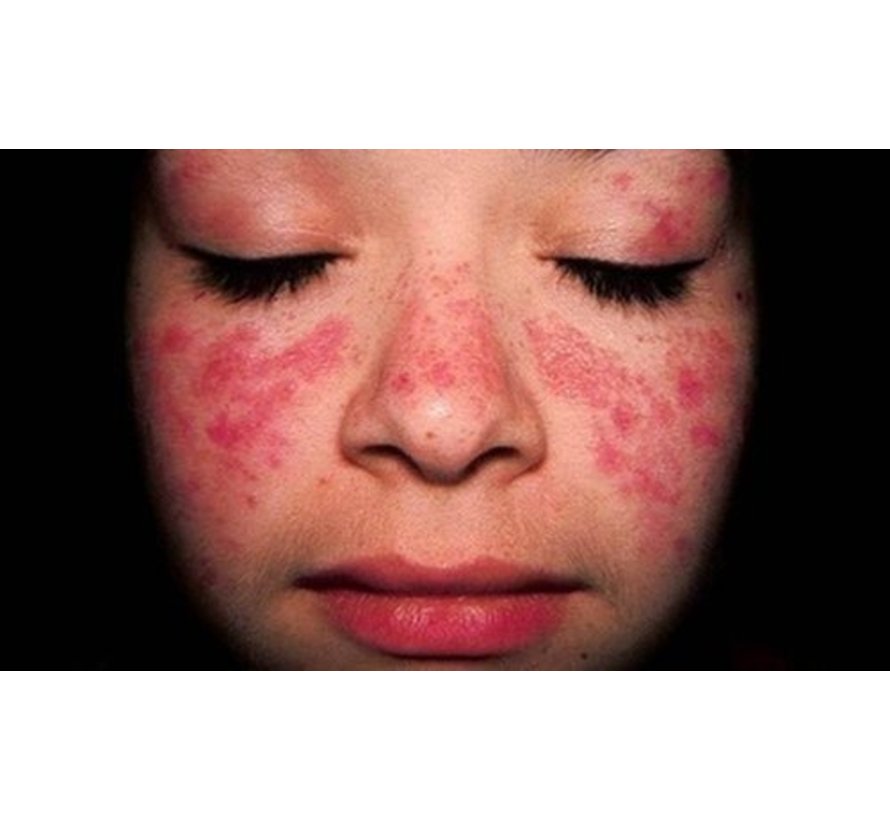Cardiolipin (IgG) antibodies SLE
Antibodies to cardiolipin (IgG) from serum is considered a biomarker for vascular complications after myocardial infarction.
Some individuals have been found to have antibodies to cardiolipin in their blood. Patients with autoimmune diseases, especially SLE, are more likely to have these antibodies.This test alone is therefore not sufficient to diagnose SLE or Lupus, but can help in the search for the diagnosisAnticardiolipin
antibodies give an increased risk of thromboses: even at a young age. Sometimes thromboses occur in vessels where thromboses normally rarely occur, such as liver or kidney vessels. Thrombosis can cause a heart attack, pulmonary embolism or cerebral infarction. Such antibodies are also sometimes found in women who have suffered multiple miscarriages. This set of symptoms is called antiphospholipid syndrome. Antiphospholipid syndrome is an autoimmune disease and is characterized by certain abnormal blood tests in combination with increased blood clotting, which can lead to thrombosis. In addition, patients with antiphospholipid syndrome may have a reduced platelet count and may have more frequent complications in pregnancy, such as repeated miscarriages.
APS can occur in isolation. 50% of APS patients have APS alone. About 30% of people who have systemic lupus erythematodes (SLE) also have APS.
If one has only APS, there is little chance that SLE will later develop in addition.
As with most autoimmune diseases, APS is more common in women than in men. 60% are women, 40% are men. The disease usually manifests itself between the ages of 20 and 40.
The disease is also known as Hughes syndrome. This name comes from the English physician Professor Hughes, working in the lupus clinic in London, who first described the disease. Both names sometimes get a little mixed up, however, the most common worldwide is antiphospholipid syndrome, abbreviated as APS.
Antiphospholipid syndrome as a separate entity was only recognized in 1985 and therefore not much is known about it and very little information can be found about it. Much research is still needed to better understand the disease and develop better treatments.
Circulating antibodies to phospholipids have caused much controversy in recent years because of their association with thrombotic processes, for example in lupus erythematodes disseminatus (LED). They bind to phospholipids of platelets and endothelium, causing platelet aggregation to occur when the vascular wall has reduced production of prostacyclin. Thus, increased antibody titers against cardiolipin, a mitochondrial phospholipid-containing antigen from cardiac myocytes, have been shown in a large number of young patients with vascular occlusions.
Study
Hamsten et al. studied the occurrence of antibodies to cardiolipin in 62 patients who had recently experienced a first myocardial infarction (56 men, 6 women ages 23-44, mean 40.7 years). Patients with manifest diabetes mellitus and (or) autoimmune diseases such as LED were excluded. Three, 12 and 36 months after the infarction, blood samples were collected and cardiolipin antibody titers determined, among other things.
Based on this, the patients were divided into an anticardiolipin-positive and anticardiolipin-negative group. Seven patients were positive on all three measurement occasions and 13 patients twice. There were no differences between the positive and negative groups with regard to cardiovascular risk factors, angiographic findings after infarction, complement values (C3 and C4) and platelet count. Two patients in the anticardiolipin-negative group had antibodies to nuclear factors. There was no correlation between the anticardiolipin titers and the titers of antibodies directed against DNA.
Arterial and (or) venous vessel occlusions occurred in 20 of 62 patients during an observation period of 36 to 64 months after the infarction. Eight of these 20 belonged to the group of 13 with at least twice a five times elevated positive antibody titre against cardiolipin (cerebral infarction 2 times, arterial vascular occlusion in one leg 2 times, recurrent myocardial infarction 3 times, pulmonary embolism 1 time, deep venous thrombosis 1 time). The authors conclude that a repeatedly strongly elevated antibody titre against cardiolipin after myocardial infarction at a relatively young age implies an increased risk of cardiovascular accidents, arterial or venous, and recommend anticoagulant or platelet aggregation inhibitor treatment for this group.
The question of whether titers of antibodies to cardiolipin were already elevated before the first infarction could not be answered with this study.
LiteratureHamsten
A, Norberg R, Björkholm M, Faire U de, HolmG. Antibodies to cardiolipin in young survivors of myocardial infarction: anassociation with recurrent cardiovascular events. Lancet 1986; i:113-5
Cardiolipin IgG
- the result is good (negative) if it is below 10 U/ml
- the result is on the borderline if it is between 10 - 40 U/ml
- the result is positive (not good), antibodies against cardiolipne have been measured, if the result is higher than 40 U/ml.
Also available on request are:
- antibodies to cardiolipin screening
- antibodies to cardiolipin (IgA)
- antibodies to cardiolipin (IgM)





